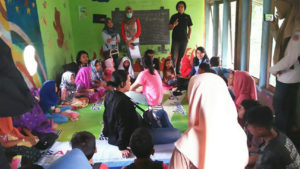

Hello CIMSA! This time we will give you a project report from SCORP CIMSA UNEJ. This project is called POWER RANGER. Is the title interesting enough to make you curious? if you want to know more about power ranger and what we do, go read this report below!
POWER RANGER is short for Empowering Children Eradicating Occupational Disease in Jember. The reason why we do this project is because the number of child labor in agricultural sector in Jember is very high, especially in the tobacco industry. There are children who work because they help their parents, some also become casual workers who deal directly with the company, whether pri- vate companies or state companies (PTPN). Even some of them chose to quit school and fill their days by work- ing in agriculture. This phenomenon should not be allowed, because as a child they should get their right of edu- cation. This phenomenon of child labor in the agricultural sector in Jember has ever been highlighted by the ILO. According to ILO’s research in an area in Jember (2007), about education of child workers, children who did not continue elementary school accounted for 85 % from 95 children who have attended school, child workers who go to junior high schoolas much as 13 %, while those who achieve high school education only 2 %.
This phenomenon occurs due to a variety of reasons, one of them is because this type of work does not require special skills and widely available in almost all locations of plantations and tobacco industry in Jember. But the most reason comes from the economic factor, most of them have a lack of financial condition so they have trouble fulfilling their daily needs, because of that their parents are forced to let their children work to improve their financial condition. Other factors are due to inadequate school quality and low awareness of the importance of education in rural areas. This causes the interest of some of them to go to school to decline and arise a mindset “I better working than go to school because I can earn money”.
As we know, working in agriculture sector has a variety of dangerous risk factors such as exposure to high temperatures, pesticides, and organic dust. Working in agriculture often also requires long hours and the use of heavy and dangerous machine tools. These dangerous risk factors can have a negative impact on adults, but can you imagine what will happen to the children? Moreover, some of them do not use APD (Alat Pelindung Diri) while working, that’s why their risk factors of occupational disease are high.
Our goals in this event are to improve the knowledge of 7-15 year olds children in Jelbuk village about hygiene and occupational safety health, also increase their excitement to continue studying. We try to instil the mindset to them about the importance of education for their future, so we can prevent them from entering the workforce.
We plan to do 5 interventions until the end of the year against the target. Actually the target is children, but because they are still small and parents factor so influential, so we decided to give intervention to their parents as well, about safety and the importance of education for their children. In this project we are working with social communities called YPSM (Yayasan Prakarsa Swadaya Masyarakat). YPSM is a community that is implementing similar projects that are still being implemented up to now, but focusing more on children’s education. They held a non-formal school for children there every Saturday afternoon in a shelter.
On October 7, 2017 yesterday, we made our first intervention. The purpose of this activity is to bond with the community. We started out by being acquainted and playing with the kids in the shelter house, along with the non-formal school that held by YPSM. After that, we visit the residents/parents there by door to door, also to inform that we will implement a sustainable project in this region. The location of this project is in the area near the mountains, the distance between houses is a bit far, so we divided ourselves into several groups and came to the houses one by one. Our second intervention is planned to be on 21 October 2017. The second intervention agenda is to conduct free medical tests for parents and children, and conduct a primary assessment about their knowledge and awareness about their health, work safety, and the importance of education. So, I think that’s all report about our project this time. Wait for us in the next project report, guys. See you later!